How Much Does It Cost to Rewire a 2,000 Sq Ft House?
when it comes to rewiring a 2,000-square-foot house, there’s a wide range of costs to consider. On the lower end, you might be looking at around $4,500 for basic rewiring services in a smaller home with straightforward electrical needs. This estimate typically covers everything from labor to materials and permit fees, but keep in mind, unexpected complications or upgrades could push that cost up a bit. Now, on the higher end of the spectrum, for larger homes with more complex wiring needs, premium materials, or extensive renovations, you could be looking at a price tag exceeding $10,000. Things like structural modifications, tricky accessibility, or specialized equipment can all contribute to bumping up those project costs.
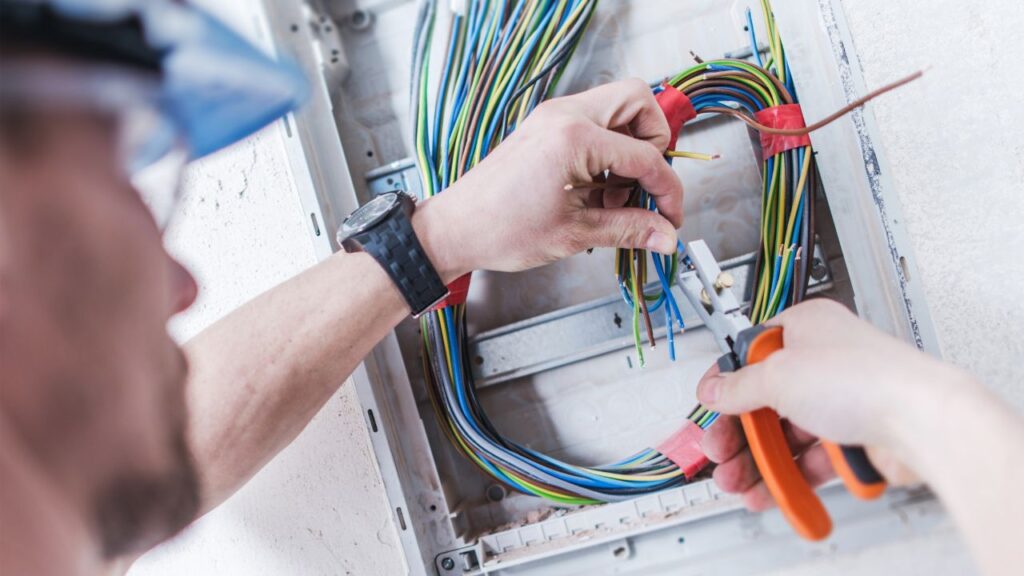
It’s all about finding the right balance between what you need and what you’re willing to invest in your home’s electrical system.
Cost to Wire a House per Square Foot
When it comes to wiring a home, you’re looking at a ballpark figure of around $6 to $12 per square foot. That covers everything from the initial electrical work to those final touches like switches and outlets. Now, the size of your house really matters here. The bigger the space, the more outlets and switches you’re going to need, and if your electrical needs are more complex, well, you might end up paying a bit more. So, if you’ve got a big, fancy estate with all the latest gadgets, you can expect those costs to climb accordingly. It’s all about making sure your home has the power it needs while keeping your budget in check.
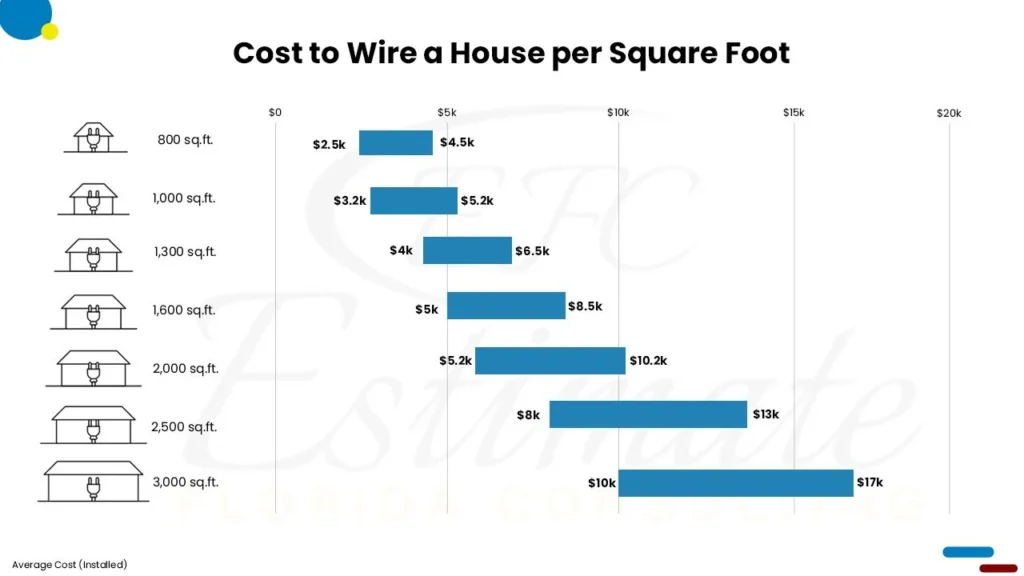
| House Size | Average Cost (Installed) |
|---|---|
| 800 sq.ft. | $2,500 – $4,500 |
| 1,000 sq.ft. | $3,200 – $5,200 |
| 1,300 sq.ft. | $4,000 – $6,500 |
| 1,600 sq.ft. | $5,000 – $8,500 |
| 2,000 sq.ft. | $5,200 – $10,200 |
| 2,500 sq.ft. | $8,000 – $13,000 |
| 3,000 sq.ft. | $10,000 – $17,000 |
Understanding House Rewiring Costs
House rewiring is a complex endeavor that involves replacing outdated wiring, upgrading electrical panels, and ensuring compliance with modern electrical codes. The cost of rewiring a 2,000 square foot house can vary significantly based on a multitude of factors. Let’s break down these factors and explore their impact on the overall cost:
1. Size of the House
The size of your house, measured in square feet, is a primary determinant of the rewiring cost. A larger house will naturally require more wiring, outlets, and electrical components, which will contribute to higher expenses.
The relationship between the size of the cost to rewire a house is often intuitive: larger houses generally require more wiring materials, components, and labor hours to complete the rewiring project. This is because a larger house typically encompasses more rooms, electrical circuits, outlets, and lighting fixtures, all of which need to be properly wired and connected.

Key Points to Consider
- Increased Wiring Needs: Larger houses have a greater number of rooms and living spaces, each of which requires its own set of wiring for outlets, lighting, and appliances. As a result, the amount of wiring materials required for a larger house can be significantly higher than for a smaller dwelling.
- Wiring Complexity: In addition to increased quantities of wiring, larger houses might also present more complex wiring scenarios. Multi-story homes, expansive layouts, and unique architectural features can lead to intricate wiring pathways, which require careful planning and skilled labor.
- Labor Hours: Rewiring a larger house usually involves more labor hours due to the sheer volume of work. Electricians need to assess, plan, and execute the rewiring project while ensuring that every room and area is properly wired to meet safety standards.
- Electrical Panel Considerations: Larger houses might require a more substantial electrical panel upgrade to accommodate the increased power demand. This upgrade ensures that the electrical system can handle the load without tripping breakers or causing potential hazards.
Room-Specific Needs: Different rooms in a larger house might have specific electrical needs. For instance, kitchens and bathrooms often require dedicated circuits for high-power appliances. Customizing the wiring for each room adds to the complexity and cost.
Cost to wire or rewire a house
The national average cost to wire a new house is between $5,000 and $12,000. The average homeowner needs to pay $10,000 for new wiring, panel, outlets, and switches installed in a 2,000 sq. ft. house.

2. Wiring Materials
The type and quality of wiring materials used play a significant role in determining the cost. Copper wiring, known for its durability and conductivity, tends to be more expensive than aluminum wiring. High-quality materials ensure safety and longevity, making them a worthy investment.
Copper Wiring:
Copper wiring is widely recognized as a reliable and efficient choice for electrical installations. Here are some of its key features:
Advantages:
- Conductivity: Copper is an excellent conductor of electricity, which means it allows electricity to flow efficiently and with minimal resistance. This characteristic reduces the risk of overheating and energy loss.
- Durability: Copper wiring is known for its durability and longevity. It can withstand various environmental factors and has a longer lifespan compared to some other materials.
- Compatibility: Copper wiring is compatible with a wide range of electrical devices and systems, making it a versatile choice for residential wiring.
- Safety: Copper is fire-resistant and doesn’t degrade over time, reducing the risk of electrical fires and system failures.
Disadvantages:
- Cost: Copper is more expensive than some other wiring materials, which can contribute to higher upfront costs for installation.
Hire Professional Contractors
Aluminum Wiring:
Aluminum wiring was commonly used in homes built during the mid-20th century, though it’s less common today. Here are its key features:
Advantages:
- Lightweight: Aluminum is lighter than copper, which can make installation easier in some cases.
- Cost: Aluminum wiring is typically less expensive than copper, which can help lower installation costs.
Disadvantages:
- Conductivity Issues: Aluminum is not as conductive as copper, which can lead to increased resistance and heat buildup. This has led to concerns about safety and the potential for overheating.
- Compatibility: Aluminum wiring can experience compatibility issues with certain electrical devices and outlets, which may require special connectors.
- Oxidation: Aluminum is more prone to oxidation and corrosion, which can lead to poor connections and increased resistance over time.
Choosing the Right Wiring Material for Your Rewiring Project
When deciding on the wiring material for your home rewiring project, it’s important to consider factors such as safety, longevity, and budget. Copper wiring is generally recommended for its superior conductivity, durability, and safety features. While it may have a higher upfront cost, the long-term benefits in terms of efficiency and reduced maintenance can outweigh the initial investment.
3. Wiring Complexity
The complexity of the wiring required also affects the cost. Older houses with outdated wiring systems may require more intricate work to replace and reconfigure the wiring. Additionally, if your house has multiple stories or unique architectural features, it might increase the complexity of the rewiring process.
In the realm of home rewiring projects, the term “wiring complexity” refers to the intricacies and challenges associated with planning, installing, and organizing the electrical wiring throughout a residence.
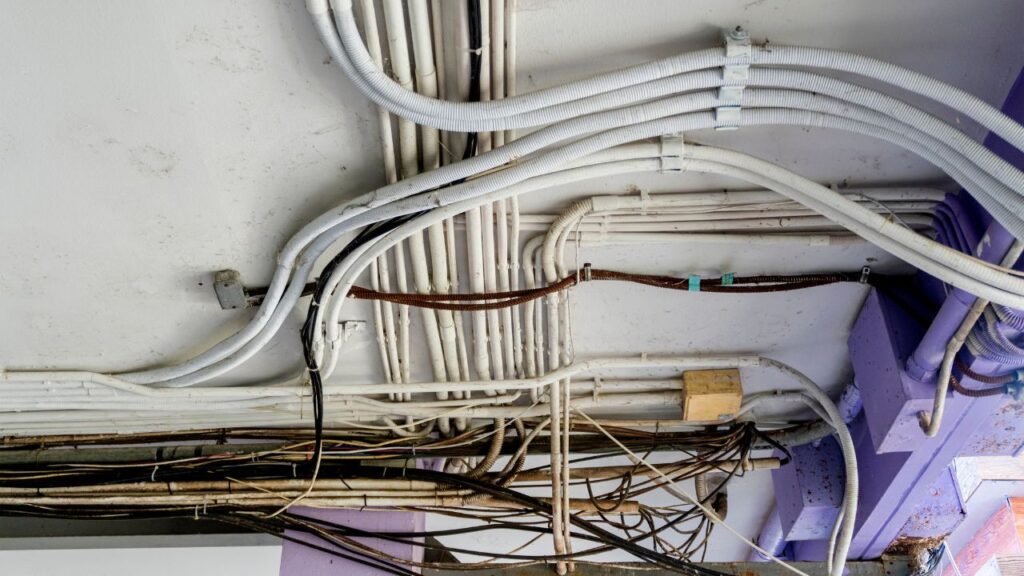
As houses evolve and technology advances, wiring complexity becomes a critical consideration for ensuring safety, efficiency, and functionality. In this article, we’ll delve into the concept of wiring complexity, explore its various dimensions, and provide insights into managing it effectively during a rewiring project.
Understanding Wiring Complexity
Wiring complexity encompasses a range of factors that collectively influence the intricacy of electrical installations within a home. These factors include:
- House Layout and Design: The layout and design of a house significantly impact wiring complexity. Multi-story homes, open-concept layouts, and intricate room configurations can present challenges when determining optimal wiring routes and connections.
- Number of Rooms and Zones: The more rooms and zones within a house, the more intricate the wiring process becomes. Different rooms have varying electrical requirements, which need to be carefully planned and executed.
- Electrical Circuits: Electrical circuits are the pathways through which electricity flows in a home. Depending on the number of devices, appliances, and outlets, the number of circuits needed can increase wiring complexity.
- Specialty Areas: Rooms with specialized electrical needs, such as kitchens and bathrooms, require dedicated circuits for high-power appliances. Properly wiring these areas adds another layer of complexity.
- Smart Home Integration: The integration of smart home technologies, including lighting controls, security systems, and entertainment systems, can introduce additional wiring complexity to accommodate these advanced features.
- Custom Lighting and Fixtures: Custom lighting designs, pendant lights, and chandeliers require unique wiring configurations that demand careful planning and installation.
We Provide 3D Rendering Services!
For Commercial and Residential Building
Turnaround time is 1-2 days
Win More Projects With Us
4. Electrical Panel Upgrade
An integral part of rewiring often involves upgrading the electrical panel to accommodate modern energy demands. Upgrading to a higher amperage panel ensures that your home can handle the increased load without risking electrical fires or overloads.
The Role of Electrical Panel Upgrade in Rewiring:
When rewiring a house, an electrical panel upgrade often goes hand in hand with the project. Here’s why:
- Increased Electrical Demand: Modern homes have significantly higher electrical demands due to the proliferation of electronic devices, appliances, and smart home technologies. An upgraded panel with higher amperage can handle this increased load safely.
- Code Compliance: Electrical codes and regulations evolve over time to ensure safety. An older panel might not meet current code requirements, and a panel upgrade ensures compliance.
- Accommodating New Circuits: Rewiring a house often involves adding new circuits for specialized areas like kitchens, bathrooms, or home offices. An upgraded panel provides the necessary capacity for these additions.
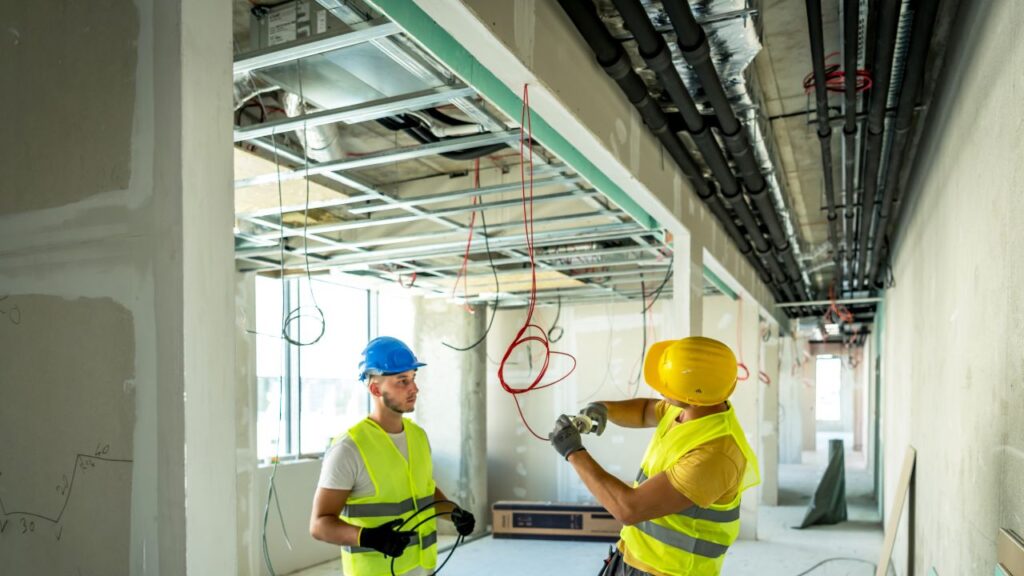
Signs that an Electrical Panel Upgrade is Needed:
- Frequent Tripping: If your circuit breakers trip frequently or if fuses blow frequently, it might be an indication that your electrical panel is struggling to handle the load.
- Outdated Panel: Homes with panels that are several decades old may not meet modern safety standards and might not have the capacity to accommodate today’s electrical needs.
- Limited Circuits: If you find yourself constantly running out of outlets or needing to unplug devices to use others, it’s a sign that your panel may not have enough circuits to support your needs.
- Buzzing or Overheating: Buzzing sounds or noticeable heat emanating from the panel can indicate underlying issues that require attention.
Download Template For Wiring & Rewiring Project Breakdown
- Materials list updated to the zip code
- Fast delivery
- Data base of general contractors and sub-contractors
- Local estimators

5. Labor Costs
Labor costs are a significant portion of the overall expense. Hiring licensed electricians to perform the rewiring is essential for a safe and compliant job. The number of hours or days required to complete the project will influence the final labor cost.
Calculating Labor Costs:
Labor costs are typically calculated based on an hourly rate or a project-based fee. Hourly rates vary depending on factors such as location, the complexity of the project, and the level of expertise of the electrician. Some projects may require a combination of both hourly rates and project-based fees, depending on the scope of work involved.
When estimating labor costs, electricians consider factors such as the number of hours needed for planning, installation, testing, and any required troubleshooting or adjustments
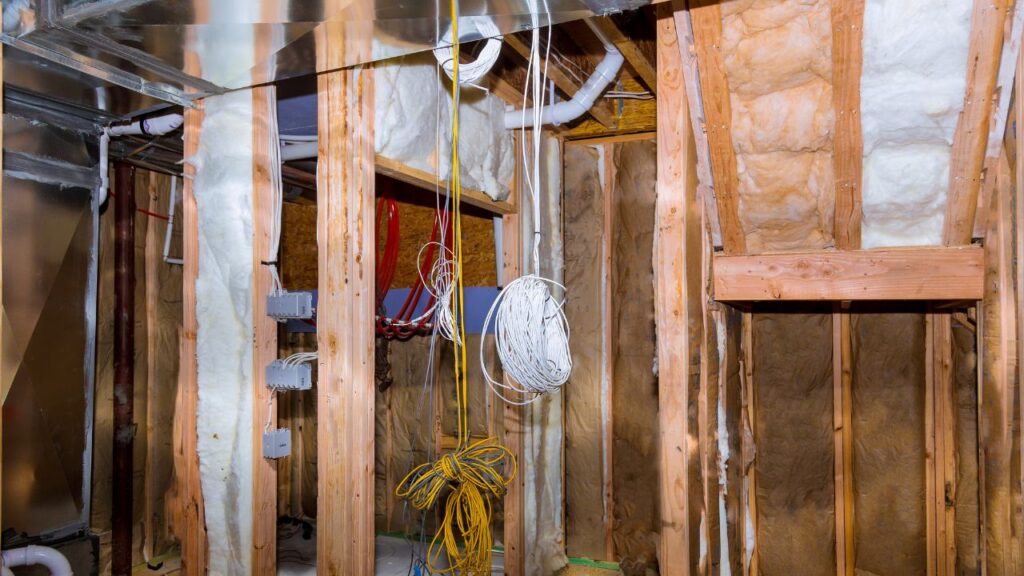
Benefits of Investing in Professional Labor:
- Safety: Electrical work carries inherent risks. Professional electricians are trained to work safely, reducing the risk of accidents, electrical faults, and fires.
- Expertise: Skilled electricians have the knowledge and experience to navigate complex wiring scenarios, troubleshoot issues, and ensure that the electrical system functions optimally.
- Code Compliance: Professional electricians are well-versed in local electrical codes and regulations. They ensure that the rewiring project adheres to these standards, minimizing potential legal and safety issues.
- Efficiency: Professionals work efficiently, completing the project in a timely manner and minimizing disruptions to your daily life.
- Long-Term Value: Well-executed rewiring enhances your home’s safety, energy efficiency, and property value. Investing in professional labor ensures that these benefits are realized.
6. Permits and Code Compliance
Electrical work requires permits and adherence to local building codes. The cost of obtaining permits and ensuring code compliance may vary depending on your location.
Average Rewiring Charges
On average, the cost to rewire a 2,000 square foot house can range from $8,000 to $15,000 or more. However, it’s important to remember that these figures are just estimates and the final cost can vary widely based on the factors mentioned above.
Budgeting for the Rewiring Project
Creating a realistic budget for your rewiring project is essential to ensure that you’re financially prepared for the endeavor. Here’s a step-by-step guide to help you budget effectively:
- Research and Estimates
Gather quotes from reputable electrical contractors, like Estimate Florida Consulting, to understand the potential cost range. Remember that the lowest quote may not always be the best option, as quality and expertise matter when it comes to electrical work.
- Factor in Contingencies
Add a buffer to your budget to account for unexpected costs that might arise during the rewiring process. It’s better to be prepared for unforeseen expenses than to be caught off guard.
- Prioritize Necessities
Identify essential upgrades and prioritize them in your budget. This way, if you need to cut costs, you can do so without compromising safety and functionality.
- Consider Long-Term Savings
While the upfront cost of rewiring can be significant, it’s important to consider the long-term savings in terms of energy efficiency, increased home value, and reduced maintenance costs.
Are You Looking For?
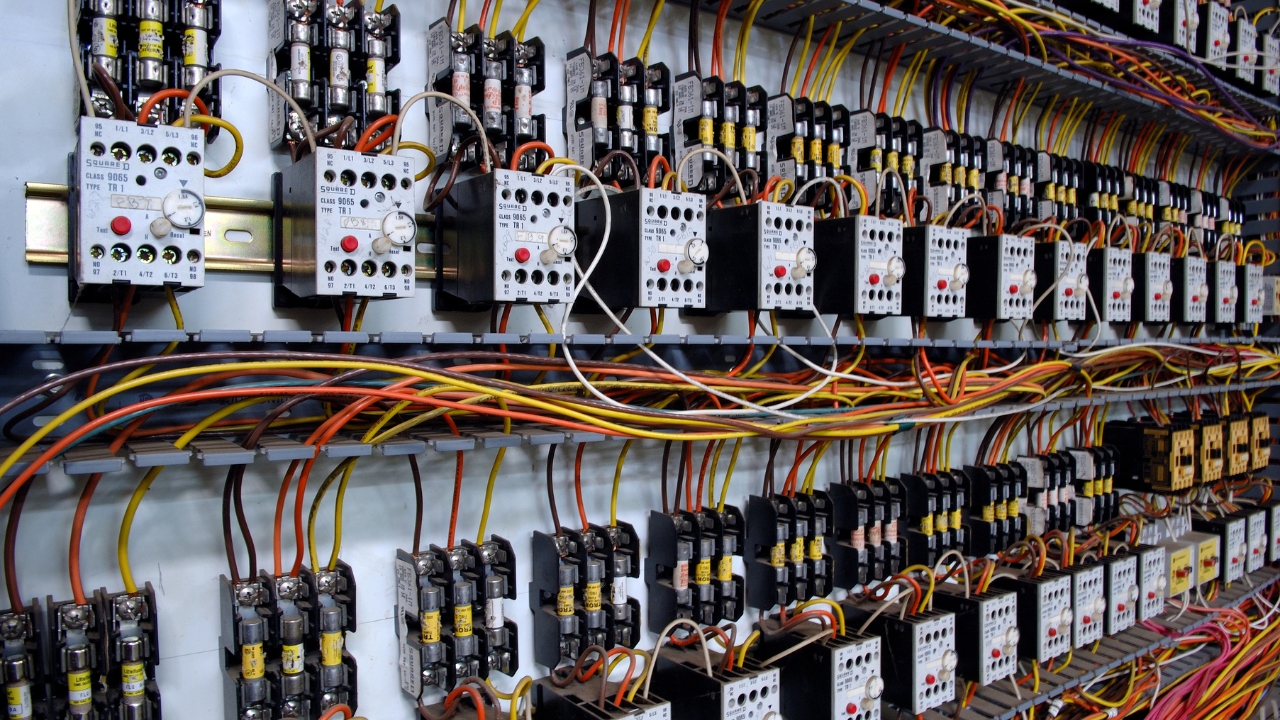
Fully Insured License
Hire Contractors & Subcontractors
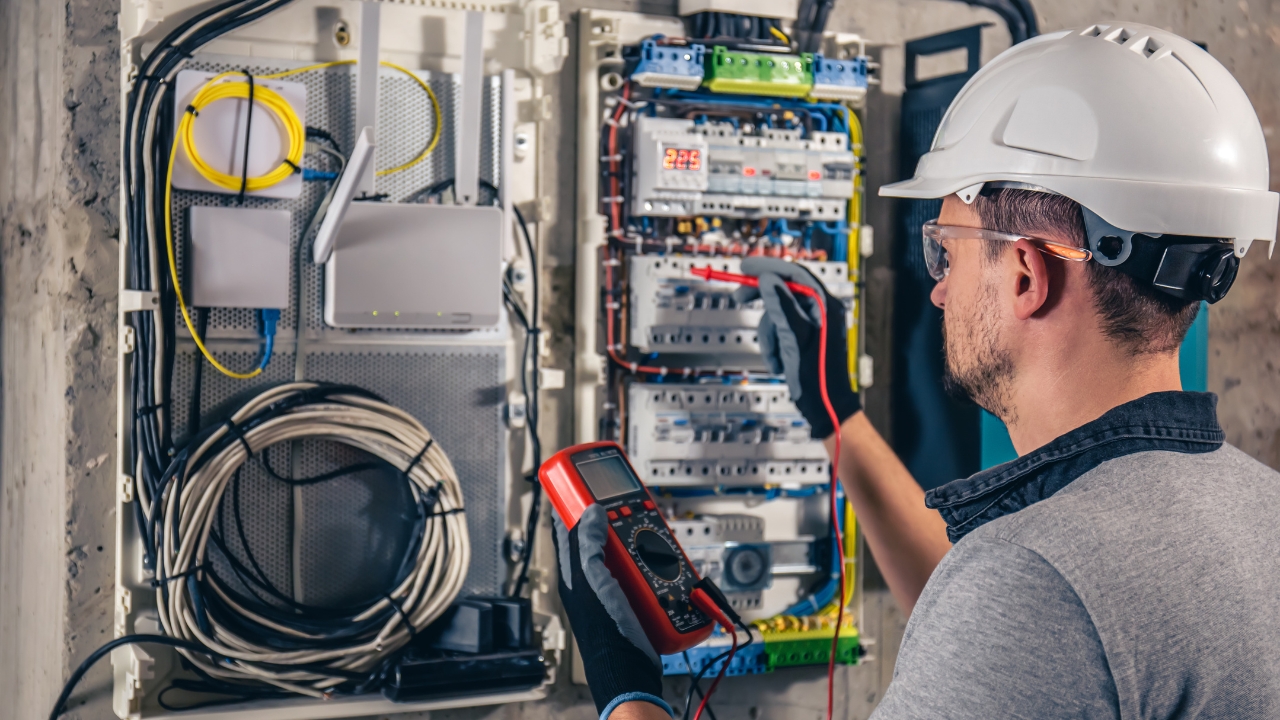
Make Informed Design Decisions Showcase Your Design Ideas
Get RenderingCall Us To Discuss More at 561-530-2845
Conclusion
Rewiring a 2,000 square foot house is a vital investment in your home’s safety, efficiency, and functionality. The cost of this project can vary widely based on factors like house size, wiring complexity, materials, and labor costs. By understanding these variables and working with experienced professionals like Estimate Florida Consulting, you can ensure a successful rewiring project that meets your needs and adheres to safety standards. Remember that while the cost may seem substantial, the benefits in terms of safety, energy efficiency, and modern functionality make it a worthy endeavor for any homeowner.
FAQs
The average cost to rewire a 2,000 square foot house can range from $8,000 to $15,000 or more. The final cost depends on factors such as house size, wiring complexity, materials used, labor charges, and additional electrical upgrades.
Several factors impact the cost of house rewiring, including the size of the house, wiring materials, complexity of the wiring, electrical panel upgrade, labor costs, necessary permits, room configuration, and any additional electrical upgrades you might want.
Rewiring a house is necessary to ensure safety, comply with modern electrical codes, and accommodate increased energy demands. Older wiring systems may pose fire hazards and fail to meet the power needs of today’s appliances and technology.
To budget effectively for a house rewiring project, start by obtaining quotes from reputable contractors. Factor in potential contingencies and prioritize essential upgrades. Consider long-term savings in energy efficiency and increased home value when evaluating the project’s overall cost.
While using cheaper wiring materials might reduce upfront costs, it’s recommended to use high-quality materials like copper wiring for safety and longevity. Cheaper materials can lead to issues over time and may not comply with modern electrical standards.
The duration of a house rewiring project depends on the size of the house, wiring complexity, and the electricians’ efficiency. On average, the project might take a few days to a week or more.
In many cases, upgrading the electrical panel is necessary to accommodate modern energy demands and ensure safety. An upgraded panel can prevent overloads and electrical fires. Your electrician can assess whether an upgrade is required.
Electrical rewiring projects typically require permits from your local building department. The specific permits needed vary by location. A licensed electrician will guide you through the permit process and ensure code compliance.
Process To Get House Rewiring Cost Estimate Report
Here I am going to share some steps to get your house rewiring cost estimate report.
-
You need to send your plan to us.
You can send us your plan on info@estimatorflorida.com
-
You receive a quote for your project.
Before starting your project, we send you a quote for your service. That quote will have detailed information about your project. Here you will get information about the size, difficulty, complexity and bid date when determining pricing.
-
Get Estimate Report
We do house rewiring cost estimating and prepare a detailed report for your project. At last, you finalize the report and finish the project.
Google Reviews





